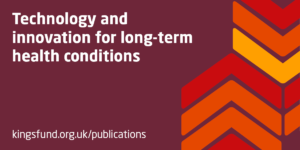New King's Fund report on technology for long-term health conditions
Posted: 3rd August 2020
 A new report from the King’s Fund – the independent charitable organisation which works to improve health and care in England – looks at how digital innovation has been effectively implemented in four unique case studies.
A new report from the King’s Fund – the independent charitable organisation which works to improve health and care in England – looks at how digital innovation has been effectively implemented in four unique case studies.
One of the case studies featured is UK-based social enterprise, Patients Know Best (PKB), with which the Yorkshire & Humber AHSN has worked closely. PKB’s online portal offers patients and health care staff a secure way of exchanging information and giving patients access to their medical records.
A key feature is that patients are in charge and can access all the information about themselves in real time. Patients decide who else can access their information and allow new health care staff to join their team when needed, for example, when a GP or accident and emergency staff need to see their care plans.
PKB has been supported by a number of regional AHSNs since 2016 and has been adopted in more than 70 NHS trusts in England. It can now be accessed by more than five million NHS patients. Yorkshire & Humber AHSN supports the company with the wider uptake of its technology across the region.
The AHSN Network commissioned the King’s Fund to explore four different digital innovations in health services from the UK and the Nordic countries in order to demonstrate their potential to achieve change, and compare themes across geographies. The paper, Technology and innovation for long-term health conditions, continues the AHSN’s commitment to learn from and take a collaborative approach to innovation with countries in the Northern Future Forum (Denmark, Estonia, Finland, Iceland, Latvia, Lithuania, Norway, Sweden and the United Kingdom).
The paper also recognises the rapid uptake of digital innovation driven by the COVID-19 pandemic and outlines some of the questions services need to answer to sustain and implement digital technologies.
Other case studies include:
- TeleCare North programme, which provides remote treatment for people with chronic obstructive pulmonary disease (COPD)
- Helsinki University Hospital’s remote diabetes monitoring programme for children
- Huoleti app that connects patients with a support network.
The case studies illustrate the potential of digital technology to transform care, particularly through empowering patients, supporting stronger therapeutic relationships and effective teamworking across professional boundaries, and creating networks and communities to support patients.
Some key areas of discussion highlighted in the report include:
- Responsive services for unpredictable diseases
- Technology-enabled teamworking
- Relationships enabled by technology
- Collaborative design
- Iterative cycles of improvement
The paper also calls on health and care providers to assess the impact on staff and patients of the rapid transition to online services driven by the COVID-19 pandemic, to ensure changes are fully assessed and to question whether there is scope to be more ambitious in redesigning services.
Find out more about Patient’s Know Best
